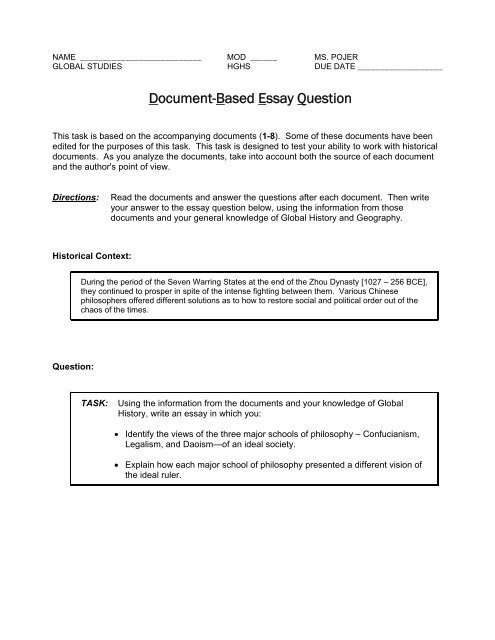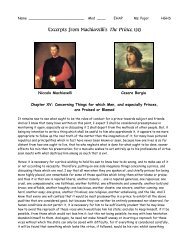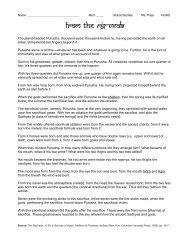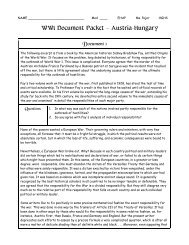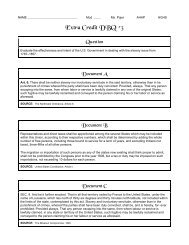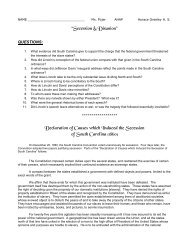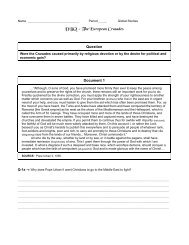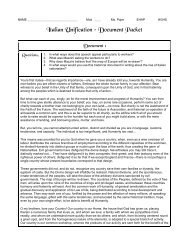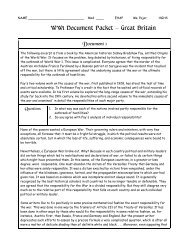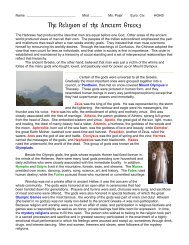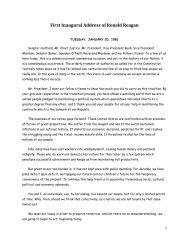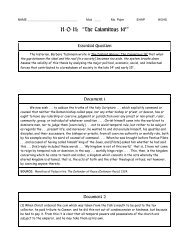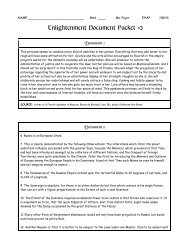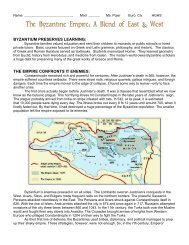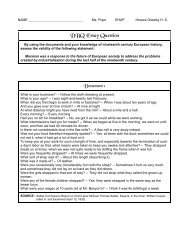Document-Based Essay Question - Historyteacher.net
Document-Based Essay Question - Historyteacher.net
Document-Based Essay Question - Historyteacher.net
Create successful ePaper yourself
Turn your PDF publications into a flip-book with our unique Google optimized e-Paper software.
NAME ___________________________ MOD ______ MS. POJER<br />
GLOBAL STUDIES HGHS DUE DATE ___________________<br />
<strong>Document</strong>-<strong>Based</strong> <strong>Essay</strong> <strong>Question</strong><br />
This task is based on the accompanying documents (1-8). Some of these documents have been<br />
edited for the purposes of this task. This task is designed to test your ability to work with historical<br />
documents. As you analyze the documents, take into account both the source of each document<br />
and the author's point of view.<br />
Directions:<br />
Read the documents and answer the questions after each document. Then write<br />
your answer to the essay question below, using the information from those<br />
documents and your general knowledge of Global History and Geography.<br />
Historical Context:<br />
During the period of the Seven Warring States at the end of the Zhou Dynasty [1027 – 256 BCE],<br />
they continued to prosper in spite of the intense fighting between them. Various Chinese<br />
philosophers offered different solutions as to how to restore social and political order out of the<br />
chaos of the times.<br />
<strong>Question</strong>:<br />
TASK:<br />
Using the information from the documents and your knowledge of Global<br />
History, write an essay in which you:<br />
• Identify the views of the three major schools of philosophy – Confucianism,<br />
Legalism, and Daoism—of an ideal society.<br />
• Explain how each major school of philosophy presented a different vision of<br />
the ideal ruler.
<strong>Document</strong> 1<br />
Yu Tzu [a disciple named Yu Jo] said, “Few of those who are filial sons and respectful brothers<br />
will show disrespect to superiors, and there has never been a man who is not disrespectful to<br />
superiors, and there has never been a man who is not disrespectful to superiors and yet creates<br />
disorder….Filial piety and brotherly respect are the root of humanity [ren].”<br />
SOURCE: Analects of Confucius.<br />
Q-1 --> What does Confucius mean by “filial piety?” How does he say one should practice it?<br />
________________________________________________________________________________________<br />
________________________________________________________________________________________<br />
________________________________________________________________________________________<br />
________________________________________________________________________________________<br />
________________________________________________________________________________________<br />
________________________________________________________________________________________<br />
________________________________________________________________________________________<br />
________________________________________________________________________________________<br />
________________________________________________________________________________________<br />
________________________________________________________________________________________<br />
________________________________________________________________________________________
<strong>Document</strong> 2<br />
Confucius said, “Lead the people with governmental measures and regulate them with laws and<br />
punishment, and they will avoid wrongdoing but will have no sense of honor and shame. Lead<br />
them with virtue and regulate them by the rules of propriety, and they will have a sense of<br />
shame and, moreover, set themselves right.” [2:3]<br />
Chi K’ang asked Confucius about government, saying, “What do you think of killing the wicked<br />
and associating with the good?” Confucius replied, “In your government what is the need of<br />
killing? If you desire what is good, the people will be good. The character of a ruler is like wind<br />
and that of the people is like grass. In whatever direction the wind blows, the grass always<br />
bends.” [12:19]<br />
Confucius said, “If a ruler sets himself right, he will be followed without his command. If he does<br />
not set himself right, even his commands will not be obeyed.” [13:6]<br />
SOURCE: Excerpts from The Analects of Confucius.<br />
Q-2 --> Identify the characteristics of the ideal ruler, according to Confucius.<br />
________________________________________________________________________________________<br />
________________________________________________________________________________________<br />
________________________________________________________________________________________<br />
________________________________________________________________________________________<br />
________________________________________________________________________________________<br />
________________________________________________________________________________________<br />
________________________________________________________________________________________<br />
________________________________________________________________________________________<br />
________________________________________________________________________________________<br />
________________________________________________________________________________________<br />
________________________________________________________________________________________<br />
________________________________________________________________________________________
<strong>Document</strong> 3<br />
Constant principles underlie Heaven’s behavior. Heaven does not prevail because you are the<br />
sage Yao or disappear because you are the tyrant Jie. Blessings result when you respond to<br />
Heaven by creating order; misfortune results when you respond to it with disorder. When you<br />
concentrate on agriculture and industry and are frugal in expenditures, Heaven cannot<br />
impoverish {make poor} your state. When you store provisions and act quickly in emergencies,<br />
Heaven cannot inflict illness on your people. When you are single-minded in your cultivation of<br />
the Way, Heaven cannot send disasters. Thus, even if they come, droughts and floods will not<br />
bring starvation, extremes of temperature will not bring illness, uncanny phenomena will not<br />
prove unlucky.<br />
On the other hand, if you ignore agriculture and industry and spend extravagantly, then Heaven<br />
cannot make your country rich. If you are negligent concerning provisions and slow to respond<br />
to crises, Heaven cannot keep your country whole. If you renounce the Way and act recklessly,<br />
Heaven cannot make you lucky. In such a case, starvation will result even without flood or<br />
drought; illness will occur even without severe weather; misfortunes will occur without any<br />
uncanny phenomena…<br />
SOURCE: Xunzi, a Confucianist, from Xunxi [213 BCE]<br />
Q-3 --> What does a ruler have to do to gain the favor of Heaven? What are the consequences of<br />
his failure to do so?<br />
________________________________________________________________________________________<br />
________________________________________________________________________________________<br />
________________________________________________________________________________________<br />
________________________________________________________________________________________<br />
________________________________________________________________________________________<br />
________________________________________________________________________________________<br />
________________________________________________________________________________________<br />
________________________________________________________________________________________<br />
________________________________________________________________________________________<br />
________________________________________________________________________________________<br />
________________________________________________________________________________________<br />
________________________________________________________________________________________
<strong>Document</strong> 4<br />
Those who are ignorant about government insistently say: "Win the hearts of the people." If<br />
order could be procured by winning the hearts of the people, then even the wise ministers Yi Yin<br />
and Kuan Chung would be of no use. For all that the ruler would need to do would be to listen to<br />
the people. Actually, the intelligence of the people is not to be relied upon any more than the<br />
mind of a baby….<br />
The reason for the ruler to look for wise and well-informed men is that the intelligence of the<br />
people is not such as to be respected or relied upon. For instance, in ancient times, when Yu<br />
opened the rivers and deepened them, the people gathered tiles and stones (to hit him); when<br />
the prime minister of Cheng, Tzu Ch'an, cleared the fields and planted mulberry trees, the<br />
people of Cheng slandered and reviled him. Yu benefited the whole empire and Tzu Ch'an<br />
preserved the state of Cheng, but each incurred slander thereby. Clearly the intelligence of the<br />
people is not to be relied upon. Therefore, to seek for the worthy and the wise in selecting<br />
officials and to endeavor to suit the people in administering the government are equally the<br />
cause of chaos and not the means for attaining order.<br />
SOURCE: Chapter 50 in the Han Fei Tzu, by the Legalist scholar, Han Fei.<br />
Q-4 --> How should a ruler deal with his subjects, according to Han Fei?<br />
_______________________________________________________________________________________<br />
_______________________________________________________________________________________<br />
_______________________________________________________________________________________<br />
_______________________________________________________________________________________<br />
_______________________________________________________________________________________<br />
_______________________________________________________________________________________<br />
_______________________________________________________________________________________<br />
_______________________________________________________________________________________<br />
_______________________________________________________________________________________<br />
_______________________________________________________________________________________<br />
_______________________________________________________________________________________<br />
_______________________________________________________________________________________<br />
_______________________________________________________________________________________
<strong>Document</strong> 5<br />
…To govern the state by law is to praise the right and blame the wrong.<br />
The law does not fawn {show extreme affection} on the noble….Whatever the law applies to, the<br />
wise cannot reject nor can the brave defy. Punishment for fault never skips ministers, reward for<br />
good never misses commoners. Therefore, to correct the faults of the high, to rebuke the vices<br />
of the low, to suppress disorders, to decide against mistakes, to subdue the arrogant, to<br />
straighten the crooked, and to unify the folkways of the masses, nothing could match the law….If<br />
penalty is severe, the noble cannot discriminate against the humble. If law is definite, the<br />
superiors are esteemed and not violated. If the superiors are not violated, the sovereign will<br />
become strong and able to maintain the proper course of government. Such was the reason<br />
why the early kings esteemed Legalism and handed it down to posterity {succeeding generations}.<br />
Should the lord of men discard law and practice selfishness, high and low would have no<br />
distinction.<br />
SOURCE: Selection from the writings of Han Fei, a Legalist writer, 230 BCE.<br />
Q-5 --> According to Han Fei, what is the purpose of law in governing a nation?<br />
_______________________________________________________________________________________<br />
_______________________________________________________________________________________<br />
_______________________________________________________________________________________<br />
_______________________________________________________________________________________<br />
_______________________________________________________________________________________<br />
_______________________________________________________________________________________<br />
_______________________________________________________________________________________<br />
_______________________________________________________________________________________<br />
_______________________________________________________________________________________<br />
_______________________________________________________________________________________<br />
_______________________________________________________________________________________<br />
_______________________________________________________________________________________<br />
_______________________________________________________________________________________<br />
_______________________________________________________________________________________<br />
_______________________________________________________________________________________
<strong>Document</strong> 6<br />
The Way produces the One.<br />
The One produces two.<br />
Two produces three.<br />
Three produces the myriad {many} creatures.<br />
The myriad creatures shoulder yin and embrace yang,<br />
and by blending these qi {vital energies} they attain harmony….<br />
And so sometimes diminishing a thing adds to it;<br />
Sometimes adding to a thing diminishes it…. [Chapter 42]<br />
SOURCE: Excerpts from Laozi [Lau Tzu], The Daodejing [Tao Te Ching].<br />
Q-6 --> Identify the symbol illustrated above. What is the meaning behind this symbol for a<br />
follower of Daoism??<br />
_______________________________________________________________________________________<br />
_______________________________________________________________________________________<br />
_______________________________________________________________________________________<br />
_______________________________________________________________________________________<br />
_______________________________________________________________________________________<br />
_______________________________________________________________________________________<br />
_______________________________________________________________________________________<br />
_______________________________________________________________________________________<br />
_______________________________________________________________________________________<br />
_______________________________________________________________________________________<br />
_______________________________________________________________________________________<br />
_______________________________________________________________________________________
<strong>Document</strong> 7<br />
….Manifest plainness.<br />
Embrace simplicity.<br />
Do not think just of yourself.<br />
Make few your desires. [Chapter 19]<br />
…Those who make a display of themselves are not illustrious.<br />
Those who affirm their own views are not well known.<br />
Those who brag about themselves are not accorded merit.<br />
Those who boast about themselves are not heard of for long.<br />
From the point of view of the Way [Dao], such things are known as “excess<br />
provisions and pointless activities.”<br />
All creatures find these repulsive;<br />
And so one who has the Way does not abide in them. [Chapter 24]<br />
…Streams and torrents flow into rivers and oceans,<br />
Just as the world flows into the Way. [Chapter 32]<br />
SOURCE: Excerpts from Laozi’s, The Daodejing.<br />
Q-7 --> List two key Daoist ideas. How does one seek the Dao [the Way]?<br />
_______________________________________________________________________________________<br />
_______________________________________________________________________________________<br />
_______________________________________________________________________________________<br />
_______________________________________________________________________________________<br />
_______________________________________________________________________________________<br />
_______________________________________________________________________________________<br />
_______________________________________________________________________________________<br />
_______________________________________________________________________________________<br />
_______________________________________________________________________________________<br />
_______________________________________________________________________________________<br />
_______________________________________________________________________________________<br />
_______________________________________________________________________________________<br />
_______________________________________________________________________________________
<strong>Document</strong> 8<br />
In governing men and in serving heaven, there is nothing like moderation. For only by<br />
moderation can there be an early return to the normal state of humankind. This early return<br />
is the same as a great storage of virtue. With a great storage of virtue there is nothing that<br />
may not be achieved. If there is nothing that may not be achieved, then no one will know to<br />
what extent this power reaches. And if no one knows to what extent a man’s power reaches,<br />
that man is fit to be the ruler of a state…; practice non-interference in order to win the<br />
empire….<br />
The greater the number of laws and enactments, the more thieves and robbers there<br />
will be. Therefore the Sage [Laozi] says: “So long as I do nothing, the people will right<br />
themselves. If only I keep from meddling, the people will grow rich. If only I am free from<br />
desire, the people will come naturally back to simplicity….<br />
SOURCE: The Sayings of Lao Tzu, translated by Lionel Giles.<br />
Q-8 --> According to Daoism, how should a ruler govern?<br />
_______________________________________________________________________________________<br />
_______________________________________________________________________________________<br />
_______________________________________________________________________________________<br />
_______________________________________________________________________________________<br />
_______________________________________________________________________________________<br />
_______________________________________________________________________________________<br />
_______________________________________________________________________________________<br />
_______________________________________________________________________________________<br />
_______________________________________________________________________________________<br />
_______________________________________________________________________________________<br />
_______________________________________________________________________________________<br />
_______________________________________________________________________________________<br />
_______________________________________________________________________________________<br />
_______________________________________________________________________________________<br />
_______________________________________________________________________________________


